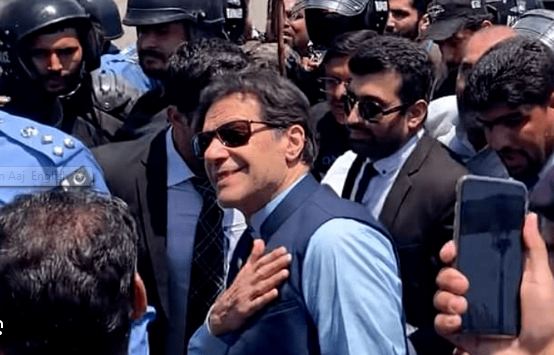ISLAMABAD, NOV 21: The Islamabad High Court (IHC) on Tuesday declared illegal the law ministry’s August 29 notification for the jail trial of PTI chief Imran Khan in “judicial lockup” in the cipher case.
The verdict, which was reserved earlier in the day, was issued on an intra-court appeal filed by Imran against a single-member bench’s decision approving the ex-premier’s jail trial in the cipher case.
It must be noted that on August 29, the IHC had suspended the PTI chief’s sentence in the Toshakhana case, but a special court established under the Official Secrets Act had directed jail authorities to keep Imran in “judicial lockup” in the cipher case.
A notification issued by the law ministry the same day had stated that the Law and Justice Division had “no objection” to Imran’s trial in the cipher case being held at Attock jail. In September, Imran was shifted to Adiala jail.
In the verdict, an IHC division bench, comprising Justice Miangul Hassan Aurangzeb and Justice Saman Rafat Imtiaz, declared Imran’s intra-court appeal maintainable.
The short order said that the notification issued by the law ministry on August 29 for Imran’s jail trial was declared to be “without lawful authority and no legal effect for want of an order by the appropriate government and fulfillment of requirements provided in Section 352 of the CrPC as well as Rule 3 in Part-A of Chapter-1 in Volume-III of the Rules and Orders of the Lahore High Court.”
Further, the order said that the “designation of the Special Court (Anti-Terrorism-I) Islamabad, to try cases reported under the Official Secrets Act, 1923 through notification dated 27.06.2023 issued by the Ministry of Law and Justice is valid and lawful.”
The order said that there was no provision in the Code of Criminal Procedure which compelled the magistrate to hold court in a usual courtroom.
“In exceptional circumstances and where it is conducive to justice, a trial can be conducted in jail in a manner that fulfills the requirements of an open trial or a trial in-camera provided it is in accordance with the procedure provided by law,” it said.
Further, notifications issued by the law ministry regarding Imran’s jail trial on September 12, September 25, October 3, October 13 were declared to be “without lawful authority and no legal effect”.
Moreover, notifications issued by the law ministry on November 13 and November 15 after decisions taken by the cabinet were “declared to be of no legal consequence”. The court said that the November 15 notification “cannot be given retrospective effect”.
The order said, “Consequently, the proceedings with effect from August 29 and the trial conducted […] in jail premises in a manner that cannot be termed as an open trial stand vitiated,” the order said.
The cipher case pertains to a diplomatic document that the Federal Investigation Agency’s charge sheet alleges was never returned by Imran. The PTI has long held that the document contained a threat from the United States to oust Imran as prime minister.
The former premier and his aide Shah Mahmood Qureshi, who is also behind bars, were indicted in the case on Oct 23. Both have pleaded not guilty.
The IHC has endorsed Imran’s indictment, disposing of his plea against the same, but had also instructed the special court judge to ensure a “fair trial”. Last week, the court halted trial court proceedings against the PTI chief while hearing his intra-court appeal.
During the previous hearing, the IHC sought the appointment record of the judge conducting the jail trial in the case. The court had also ordered the registrar to present the letter written by Judge Abual Hasnat Zulqarnain to the IHC administration for permission to conduct the ex-PM’s trial in jail.
The hearing
During today’s hearing, Imran’s lawyer Advocate Salman Akram Raja started presenting his arguments. Citing high court rules, he said a judge’s permission was mandatory for a jail trial.
“The judge then informs relevant ministry via the high court or district magistrate or commissioner’s office,” he argued.
Here, Justice Aurangzeb inquired what the judge should do foremost for a jail trial. In his response, Raja said the judge had to list reasons for the same with a “clear mind”.
However, the lawyer continued, the reasons for Imran’s jail trial were not conveyed in the Aug 29 documents. “Even if we accept that the trial was initiated by a judge, the process that followed was incomplete,” Raja argued.
Raja highlighted that the federal cabinet is empowered to approve jail trials but in this scenario, no such decision was taken until mid-November. “The federal cabinet’s approval only came when the intra-court appeal was under way,” he revealed.
Raja contended that a judicial order pertaining to the same had also not been issued yet. “The judicial order of a jail trial gives us the chance to present our stance,” the lawyer added and urged the court to declare the jail trial unlawful.
Meanwhile, Justice Aurangzeb asked if the federal cabinet’s decision was taken to fulfil legal requirements. “How can the cabinet approve something that was never sought,” the PTI counsel responded.
He said the special court judge never mentioned the previous proceedings in the case. Whereas, in the notification issued by the government, nothing similar to what the judge said was written, Raja added.
“As per Article 352, the November notification is not applicable to previous hearings,” he contended.
At that, Justice Aurangzeb asked if the lawyer was saying that the government’s order on jail trial was issued merely to fulfil legal obligations.
No, Raja replied, adding that the cabinet’s approval came without a judicial order.
The judge then said that the IHC registrar had informed the court that the process of appointing the judge was initiated by the Islamabad High Court. “We were also told that the special court judge informed the IHC before commencing the jail trial,” Justice Aurangzeb revealed.
Raja, while concluding his arguments, then contended that all the notifications pertaining to the jail trial were illegal. “If you want to conduct a jail trial, you will have to adopt a legal procedure and provide solid reasons for it,” he added.
Subsequently, Attorney General for Pakistan Mansoor Usman Awan came to the rostrum. He said a jail trial wasn’t for ordinary people to attend but at the same time highlighted that Imran’s family members were allowed to attend the proceedings.
He recalled that Imran was in prison at the time of arrest and therefore a physical remand was not taken. “If the things that exist in the law are not taking place, then you say that justice is not being served,” the AGP said and highlighted that charges were framed against the accused in front of him as per the law.
The hearing is held at a big hall in Adiala Jail, Awan further said, adding that the jail trial against Imran was being conducted due to security reasons.
After the AGP concluded his arguments, the bench reserved the verdict with Justice Aurangzeb saying that the court would first issue a short order and then a detailed one at a later time.












